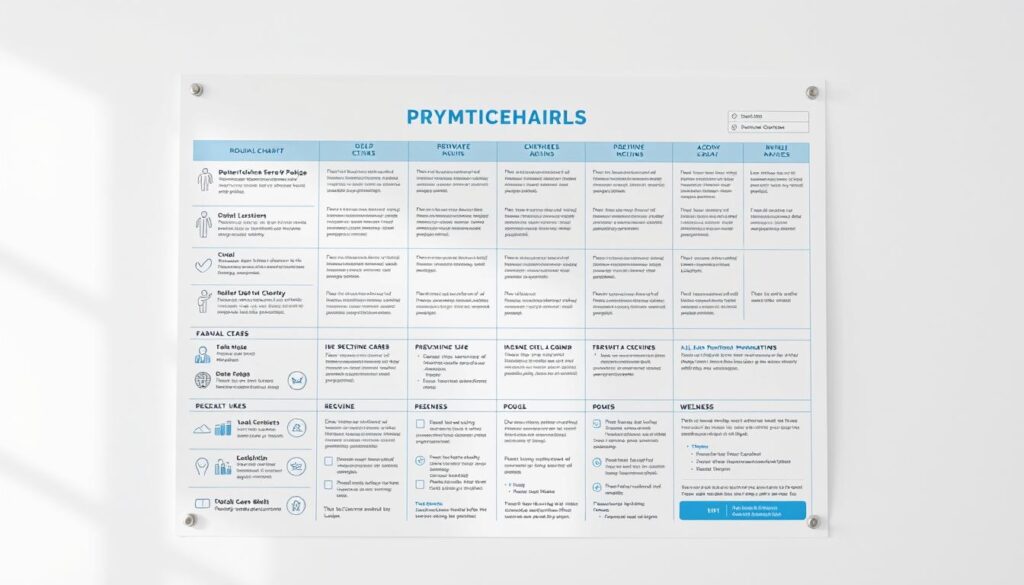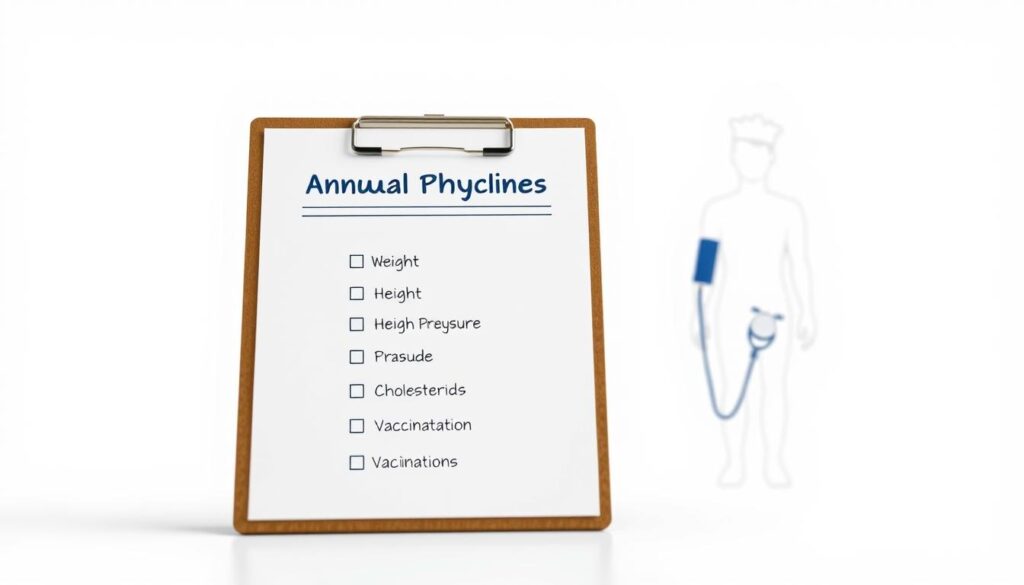Imagine walking into a doctor’s office, ready to take charge of your health. That’s what happens at annual physicals. It’s a chance to connect with your care team, discuss concerns, and catch issues early. Whether you’re in Orange City, Orlando, or St. Cloud, our clinics make it easy to prioritize your well-being.
These visits aren’t just about blood pressure checks. They’re your yearly health check-in. Your provider measures vital signs like heart rate, breathing, and temperature—key clues to your overall health. Many of us delay care until symptoms strike, but these visits help spot risks before they escalate.
Key Takeaways
- Annual exams screen for heart health, diabetes, and cancer risks using tests like cholesterol panels and mammograms.
- Most insurance plans cover preventive services at no cost, including hepatitis C screening and vaccines.
- Healthy adults in their 20s/30s can visit every two years, but those over 40 need yearly check-ups.
- Preparing a list of medications and questions helps ensure nothing is overlooked during your visit.
- Routine care helps detect 80% of chronic diseases early, reducing long-term health costs.
Why Annual Physicals Are Important
The importance of annual physicals is huge. They help protect you from health problems. Even if you feel fine, issues like high blood pressure or cholesterol might not show up without a check-up. Our clinics are open from 8:30 am to 5:00 pm every day, making it easy to find a time that works for you.
Spotting problems early can save lives. Regular visits help create a health plan just for you.
Benefits of Regular Health Screenings
These visits are more than just a quick look. They offer many benefits, including:
- Early detection of risks like diabetes (A1C under 5.7% is ideal)
- Baseline data to track changes over time
- Opportunities for lifestyle advice to improve nutrition and activity
How They Help Prevent Diseases
Annual checkups are a key defense. Here’s how:
- Blood pressure screening: Normal readings below 120/80 signal healthy heart function.
- Cholesterol monitoring: Keeping LDL under 130 mg/dL reduces heart disease risks.
- Cancer detection: Mammograms starting at 40 and HPV tests from 25 catch abnormalities early.
- Vaccination updates: Flu shots annually and shingles vaccines at 50+ protect against preventable illnesses.
Skipping exams risks missing silent issues. Regular visits ensure you and your provider can tackle problems early. Let’s schedule your next appointment today—your health depends on it.
What We Should Prepare Before the Visit
Getting ready for your annual physical makes your visit more efficient. Our annual physical checklist helps you organize. Following annual physical guidelines also saves time. Start by looking at
Gathering Medical History
- List all surgeries, chronic illnesses, and family health history (e.g., heart disease or diabetes)
- Note new symptoms, such as persistent fatigue or pain
- Share recent lifestyle changes (e.g., diet, exercise, travel)
Medications and Allergies to Discuss
Bring a written list of:
- Prescription and over-the-counter medications
- Supplements and vitamins
- Allergy details (severity, triggers)
Did you know 70% of patients forget this? Let us help you avoid missing important information.
Bringing Necessary Documents
- Insurance card and ID
- Prior test results or imaging reports
- Immunization records
Our clinics in Central Florida welcome patients at any location. Call 352-259-2159 to schedule. Arrive 15 minutes early to fill out forms.
For Medicare patients: fasting is needed, except for pediatric or gynecology visits. Check our annual physical guidelines for details. Let’s make sure your visit is as informative as possible.
What Happens During the Annual Physical
Knowing what happens at annual physical visits helps you feel ready. At our Orange City location, we start with checking your medical history and current symptoms. Then, we measure your vital signs, do a physical exam, and might run lab tests based on your age and health risks.
| Measurement | Normal Range |
|---|---|
| Blood pressure | <120/80 mmHg |
| Heart rate | 60–100 beats per minute |
| Respiration rate | 12–16 breaths per minute |
| Temperature | 98.6°F (±0.5°F) |
Next, we do a physical examination process checking your heart, lungs, abdomen, and skin. Lab tests might include bloodwork for cholesterol, glucose, or thyroid function. Women over 40 get breast and pelvic exams; men might have prostate screenings. These tests help find conditions like diabetes or high blood pressure early.
- Blood tests to assess cholesterol and blood sugar
- Urinalysis to check kidney function
- Cancer screenings based on age and family history
We also talk about your lifestyle, like diet and exercise, and address concerns about chronic diseases. Annual exams take 15–30 minutes but are key for preventive care. Stay ahead—book your exam at 938 Saxon Blvd Suite D today!
Common Tests During the Annual Physical
Knowing what typical tests at annual physical are is important. At our Semoran Blvd location, we do important screenings based on your age and health history. These tests help find problems early, so we can take care of them quickly.
| Test | Purpose | Recommended Age |
|---|---|---|
| Blood Pressure | Monitor heart health risks | Every 1-3 years |
| Cholesterol Panel | Track heart disease risk | Men: 35+ / Women: 45+ |
| Diabetes Screening (HbA1C) | Identify blood sugar irregularities | Age 45+, or earlier with risk factors |
| Mammogram | Breast cancer detection | 50-74 (every 2 years) |
| Colonoscopy | Colorectal cancer screening | 45+ or earlier with family history |
Blood tests like the complete blood count (CBC) and comprehensive metabolic panel (CMP) are common. They check for anemia, balance of electrolytes, and kidney health. We also test vitamin D levels for bones and thyroid function tests for metabolism. For cancer, we start with prostate-specific antigen (PSA) tests at 50 and lung cancer scans for former smokers 55-80.
Our team makes sure tests fit your health goals. We review results by phone, telehealth, or online. Early screenings lead to better health outcomes. Book your visit at our Orlando Semoran Blvd office for a personalized health check today.
What to Discuss with Our Healthcare Provider
Talking openly during your annual physical helps get care that fits you. Your doctor can look into things like weight changes or feeling tired. These could mean there’s something bigger going on.
At our St. Cloud location (4589 Henry C Yates Ln), we make it easy to talk about your health. Share about your diet, exercise, and stress. This way, we can prevent health problems together.
Tell your doctor about any symptoms, no matter how small. Talk about sleep issues or headaches. Be open about your lifestyle, like smoking or drinking.
Your doctor might give you advice, like eating less salt or moving more. They can help you reach your exercise goals, like 150 minutes a week.
- Symptoms: Report changes in vision, pain, or digestive issues.
- Lifestyle: Discuss dietary habits, alcohol consumption, and smoking status.
- Medications: Review current prescriptions and over-the-counter use.
Talking about your mental health is just as important. Share if you’re feeling anxious or down. We check for depression and can help you find resources.
We also talk about how to handle stress, like through mindfulness or counseling. Ask about vaccines, like the flu shot or shingles vaccine. We’ll also discuss screenings based on your age and gender.
Ask about your blood pressure, cholesterol, or diabetes risk. Your doctor will explain your lab results and help you set goals. To get ready, check out the top questions to ask. At our clinic, we want you to talk openly about your health. It’s the first step in your health journey.
Understanding the Results of Our Tests
After your annual physical, knowing your test results is key to managing your health. Typical tests at annual physical like blood work and screenings give important insights. At our Kissimmee location (910 W Vine St), we make sure you understand your results to help you move forward.
How to Interpret Lab Results
Lab values are just part of the story. Here’s how to understand the what happens at annual physical tests:
| Test | Normal Range | Significance |
|---|---|---|
| Complete Blood Count (CBC) | WBC: 4.5–11.0 K/μL | Identifies infections or anemia |
| Cholesterol Panel | Total Cholesterol: | Guides heart disease risk management |
| Glucose Test | Fasting: 70–99 mg/dL | Assesses diabetes risk |
Follow-Up Appointments for Abnormal Findings
If your results raise concerns, our team acts fast. You can expect:
- Repeat testing for confirmation
- Specialist referrals (e.g., endocrinologist for high glucose)
- Medication adjustments
Our electronic health records at 910 W Vine St make communication smooth. We look at trends over time, as patterns are more important than single results. Always keep your follow-up appointments—they guide you to better health.
Vaccinations and Preventative Care
Your annual physical is more than just a checkup. It’s a chance to make sure your vaccines are current. Our team at Davenport’s 40230 US Hwy 27 Suite #130 location checks your immunization history. This helps find any missing shots.
Vaccines keep you healthy and help keep the community safe. They are a key part of the benefits of annual physical screenings.
Vaccines Tailored to Your Age Group
- Children: MMR, polio, and DTaP boosters ensure lifelong immunity.
- Adults: Flu shots, shingles vaccines after 50, and Tdap every 10 years.
- Seniors: Pneumonia and booster doses for waning immunity.
Maintaining Protection Over Time
Immunity can fade, and new vaccines come out. At your visit, we talk about the latest shots like the flu vaccine or HPV doses. The benefits of annual physical include getting these important updates.
Most health plans cover vaccines fully, making prevention affordable. We also look at preventive steps like exercise, healthy eating, and quitting smoking. At Davenport, we follow CDC guidelines to make your care plan fit you. Staying up-to-date on vaccines helps fight off preventable illnesses and supports your long-term health.
Managing Chronic Conditions During the Visit
Annual physicals are key for tracking and adjusting care for chronic conditions. At our Mt. Dora location (111 Waterman Ave), FL), 34757), we create personalized plans. This helps you manage ongoing health challenges.
By reviewing lab results and vital signs, we make sure treatments match your health goals.
Strategies for Diabetes Management
Regular blood sugar testing and HbA1c checks show long-term glucose trends. Our team checks kidney function and eye health to prevent complications. We tailor nutrition and activity plans to your needs.
Patients often adjust medications or diets based on these results. This ensures diabetes stays under control.
- Blood tests assess blood sugar trends and organ health.
- We review medication effectiveness and side effects impact.
- Personalized diet and exercise goals are updated each visit.
Monitoring Heart Disease Risk Factors
Managing heart health involves tracking blood pressure, cholesterol, and BMI. We discuss lifestyle changes like diet or exercise to reduce risks. For existing heart conditions, lab results guide adjustments to medications or care plans.
This prevents severe outcomes.
- Blood pressure and cholesterol screenings identify risk levels.
- BMI assessments highlight weight-related cardiac risks.
- We recommend exercise tolerance tests to gauge physical activity safety.
Annual physicals help spot warning signs early, preventing complications. Our coordinated care teams at Mt. Dora ensure chronic conditions are managed holistically. Prioritizing these visits keeps you proactive about long-term health.
Understanding Health Insurance and Annual Exams
Annual physical guidelines change a lot between insurance plans. At our Orlando Windermere Rd location, we guide patients through their coverage. Here’s what you can expect at annual physical visits about billing and benefits.

Medicare and plans like BCBS or UnitedHealth often cover preventive care. Check out these annual physical guidelines to avoid surprise costs:
Coverage Options for Annual Physicals
- Medicare Part B: Free “Welcome to Medicare” visit + yearly Wellness visits. Includes cognitive screenings and health risk assessments.
- Commercial Plans: Most cover diabetes, cholesterol, and cancer screenings at no cost under preventive care benefits.
- Exceptions: Tests outside routine checks (e.g., X-rays for new symptoms) may require copays or coinsurance.
| Coverage Type | Services Covered | Cost Details |
|---|---|---|
| Medicare Wellness Visit | Risk assessments, BMI measurements, cognitive screening | No out-of-pocket costs |
| Commercial Insurance | Blood pressure checks, mammograms, colonoscopies | No copay for preventive services |
| Out-of-Network | All services | Potential deductibles or coinsurance |
Questions to Ask Your Insurance Provider
“Know your coverage before arriving. We recommend confirming these details in advance.”
Ask your provider:
- Is the Orlando Windermere Rd location in-network?
- What screenings are fully covered under preventive care?
- Are follow-up tests from the physical billed separately?
Our staff checks your plan to estimate costs. Schedule early to talk about coverage for lab work or specialist referrals. Prioritizing preventive care helps catch issues early, as required by annual physical guidelines.
Our Rights During the Annual Physical
Knowing your rights makes the annual physical exam process smoother. At SouthCoast Health’s Clermont – FL-50 location, we make sure you understand your legal rights. You decide who sees your health information and how it’s shared. Here are your rights:
Patient Privacy and Confidentiality
- Privacy laws like HIPAA keep your medical records safe from unauthorized access.
- You can talk about sensitive topics without worrying about them being shared unless it’s legally needed (like abuse reporting).
- Teenagers can ask for private talks about reproductive or mental health issues.
The Right to Full Disclosure of Results
After exams, you have the right to:
- Get clear explanations of lab results and diagnoses.
- Ask for copies of imaging scans or bloodwork reports.
- Choose which tests to do during your annual physical checklist.
If you don’t understand the results, you can ask for a second opinion or review. Our providers will explain the risks and benefits of each procedure.
You have choices: You can ask to correct your records, stop sharing your data, or appeal if your privacy is broken. At our Clermont office, we give you extra time to ask questions. We want you to leave knowing your health status.
The Role of Specialists in Our Health Journey
Annual physicals often show health trends that need more expertise. If your primary care finds issues like high cholesterol or ongoing symptoms, they might suggest seeing a specialist. At our Clermont location, we make sure you get to trusted specialists in central Florida easily.
Referrals to Specialists When Necessary
Referrals are needed when tests or symptoms point to specialized care. Here are some common reasons:
- Unusual lab results needing further analysis
- Chronic conditions like heart disease or diabetes needing management plans
- Family history of cancers or genetic disorders
Collaborating with Our Healthcare Team
Good teamwork starts with your primary care team sharing findings securely. The value of annual physicals is in spotting when specialist help can make a big difference. Patients help by keeping all providers updated on their health.
At our Clermont clinic, we work closely with specialists to make referrals smooth. This teamwork makes sure no detail is overlooked, whether it’s managing blood pressure or checking on screening results. Your health journey is best when all caregivers work together.
Scheduling Our Next Annual Physical
Keeping up with annual physicals is vital for your health. Following annual physical guidelines helps keep an eye on important health markers like blood pressure and cholesterol. Planning ahead ensures you get the most out of these exams, like catching diseases early.
Importance of Consistent Check-Ups
Regular visits are key to tracking health changes. For example, people over 40 should get checked every year to watch for risk factors. Those with ongoing health issues might need to go more often. These visits also let you talk about lifestyle choices, helping you stay healthy.
How to Choose the Right Time for Our Visit
When to go is important. Here are some tips:
- Match it with your insurance renewal to keep coverage.
- Choose a time when your schedule is clear.
- Plan with other health screenings to save time.

| Age Group | Recommended Frequency |
|---|---|
| Under 40 (no chronic conditions) | Every 1–2 years |
| 40–64 | Annually |
| 65+ | Annually or as advised |
| Chronic conditions | Annually or more often |
At TrustCare, we make booking easy with one call: (352) 259-2159. You can reach any location, keeping your care continuous. We suggest booking your next visit before you leave to avoid waiting.
Conclusion: Maintaining Our Health Year-Round
Your annual physical is more than just a check-up. It’s the start of a lifelong journey to health. By using your annual physical checklist, you set a health baseline. This guides your daily choices.
At our clinics across Central Florida, we support your health journey. We offer urgent care and lab diagnostics. This helps you stay healthy all year.
Building Healthy Habits Beyond the Exam Room
After your what to expect at annual physical review, start making changes. Aim for 30 minutes of exercise each day. Eat more plant-based meals and avoid tobacco.
Our providers can adjust these steps based on your health risks. For example, if you have a family history of heart disease or diabetes. Direct Primary Care offers ongoing support and personalized advice.
Community Resources for Sustained Wellness
Look for local resources like farmers markets for healthy food. There are also smoking cessation programs. Our network includes fitness centers and mental health services.
Apps and online tools, like telemedicine, keep you connected to care. With 9 locations in Central Florida, we make wellness easy to access.
Remember, 80% of chronic diseases can be prevented by changing your lifestyle. Let your annual exam results guide you. Schedule your next check-up today to stay healthy and build a strong foundation for life.


